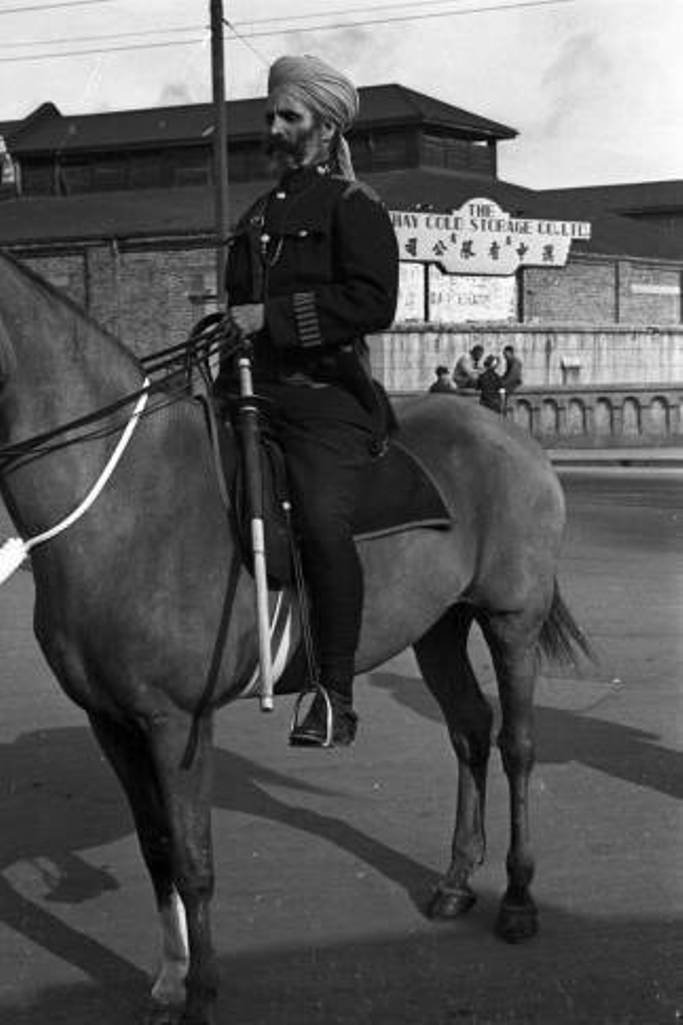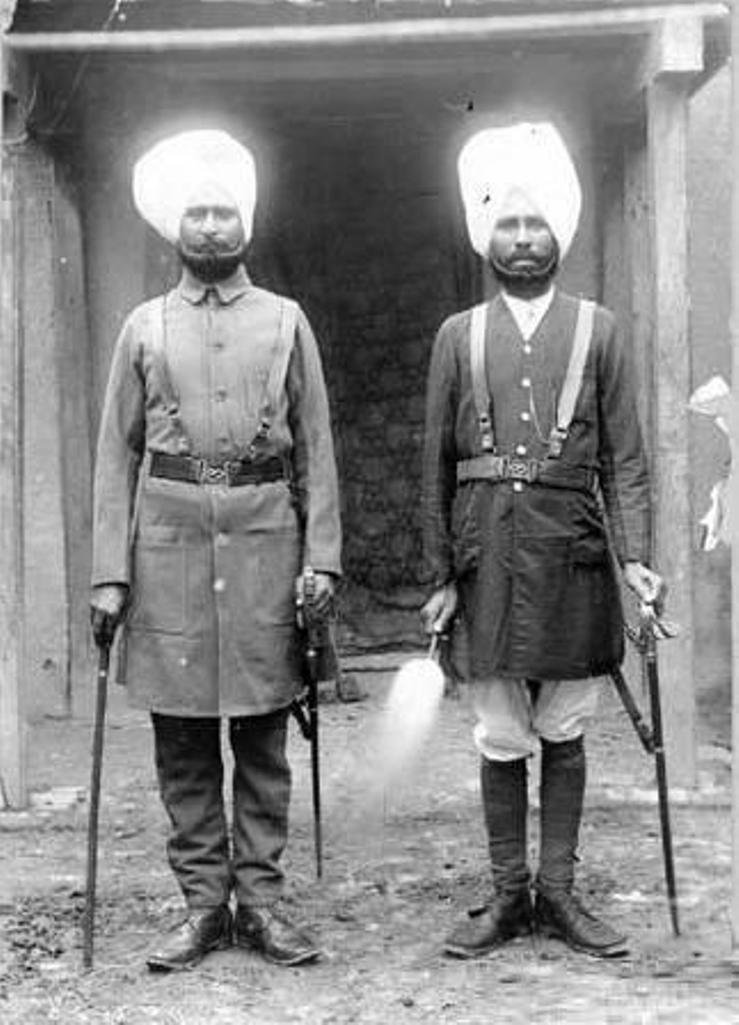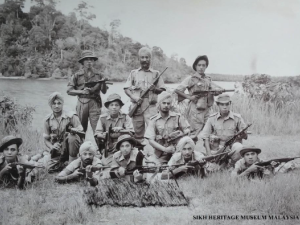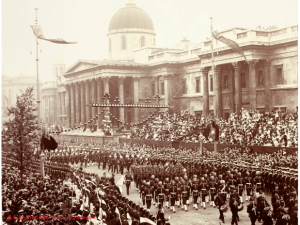 |
| A mounted Sikh soldier-Shanghai |
The British dispatched Sikh regiments to China leading up towards the Opium War, which ended with the Treaty of Nanking in 1842 and the opening up of Chinese ports to the British. After China's defeat at the hands of the British in the First Opium War (1839-42), the Treaty of Nanking, signed on 29th August 1842, formed the basis for the country's relations with the West for almost a century. As imperial powers carved out the history of Shanghai after the Opium Wars of China in the 1850s, a sizeable part of that history was played out by the Sikh community here.
By 1851, another rebellion called the 'Taiping Rebellion' stated against the British and other Europeans and to quell this, the British brought in The Sikh Regiment. The Taiping rebellion was the world's bloodiest civil war. Lasting for 13 years from 1851 to 1864, it nearly toppled the Qing Dynasty and resulted in the death of 20 million people more than the entire population of England at that time. It was also viewed by many historians as a precursor to the Long March and the Cultural Revolution.
The Boxer Rebellion, also called the Boxer Uprising was a proto-nationalist movement by the "Righteous Harmony Society. The Boxer Rebellion was a rebellion in China of foreign influence in religion, politics and commerce. In June 1900 in Beijing, Boxer fighters threatened foreigners and forced them to seek refuge in the Legation Quarter. In response, the initially hesitant Empress Dowager, urged by the conservatives of the Imperial Court, supported the Boxers and declared war on foreign powers. For 55 days, the Boxers laid siege to the heart of Beijing. On August 4, 1900 the soldiers of the Eight Nation Alliance left the city of Tianjin to march to Beijing to relieve the Siege of the Legations. Upon arriving at Yang Tsun, they were attacked by the rebellion. In the Battle of Yang Tsun, the post of honor in the fighting was taken by a British regiment of Sikhs ( 24th Punjab Regiment) and a regiment of Americans, who raced each other over a plateau of 5000 yards, exposed to a fierce hail of shell and rifle fire, to occupy a formidable entrenched position. Eventually the Sikhs and the Americans reached a position within 300 yards of the enemy. Then the order was given to fix bayonets, and a simultaneous charge was made, immense slaughter being inflicted upon the Chinese. The battle culminated in a brilliant charge of the Sikhs and American forces. Simultaneously the British Sikhs and the 14th American Regiment occupied Yang Tsun. Finally the relief force of more than 3000 soldiers from Sikh Regiments advanced to the legations, lifting the siege, which eventually paved the way for the occupation of Beijing by foreign troops.
The Chinese government was forced to sign the "Boxer Protocol", which provided for the implementation of the leaders of the rebellion, and the payment of compensation to the injured nations.
 |
| Officers of the Sikh regiment, China1900, - An Officer On the Right Holding a 'Chaur Sahib'. At the back is the Darbar |
During World War 1, Sikhs were stationed as part of the Garrison of Tianjin in China and took part in the Siege of Tsingtao. In early August the Japanese entered the war and sent a division to capture the German port of Tsingtao. The Twenty-Fourth and half the 36th Sikhs were sent from Tientsin in September to represent the Allies and take part in the capture of the place. After much hard digging in heavy rain and in great discomfort Tsingtao fell on 7th November.
For much of the first half of the 20th century, the Ch'ing Pang held Shanghai in their grip, only occasionally bothered by local police. The Ch'ing Pang (Green Gang) secret society was a huge criminal organization comparable in many respects to the Sicilian mafia. It was the true power in Shanghai, its various factions controlling practically all aspects of criminal life, including the vast profits of the illegal opium trade, the gambling rackets, prostitution, weapon smuggling, extortion, kidnapping, murder, etc. Many Chinese police officers in all three parts of the city were members, and the French Concession actually had a secret deal with the gangs, which offered protection against the warlords outside of Shanghai in exchange for non-prosecution. In short, corruption among the police corps was widespread and rampant.
The British deployed Sikh policeman as law enforcement officers. These handsome, stalwart, men may be seen all over the Oriental possessions.
 |
| Sikh Traffic policeman |
They were deployed in ports like Shanghai, where their trading companies had set up a large presence by the early twentieth century. The force was founded in 1854, and policed the International Settlement at Shanghai until 1943. Sikh policemen were a standard feature of street life in the International Settlement.
Between 1925 and 1930 Ward Road Gaol became a prison predominantly housing Chinese prisoners, controlled and run by a predominantly British and Sikh staff. The majority of warders were Sikhs . Conditions inside Ward Road Gaol were considered to be some of the harshest in the world. Silence was enforced at all times, overcrowding was rife, and in 1934 there were only 2925 cells between its 6000 inmates. It was the largest prison in the world and earned a reputation as the "Alcatraz of the Orient".
The Sikhs were also employed as traffic policeman not only to keep automobile traffic untangled, but must contend, with horse-drawn carriages, man-drawn rickshaws, sedan chairs, and people carrying huge hardens. The streets are narrow, and everybody takes the centre of the road. 'The Sikh likes police duty and his loyalty to the white man is unquestioned. Nothing suits him better than to swing an obstreperous Chinaman around by his pigtail'.





